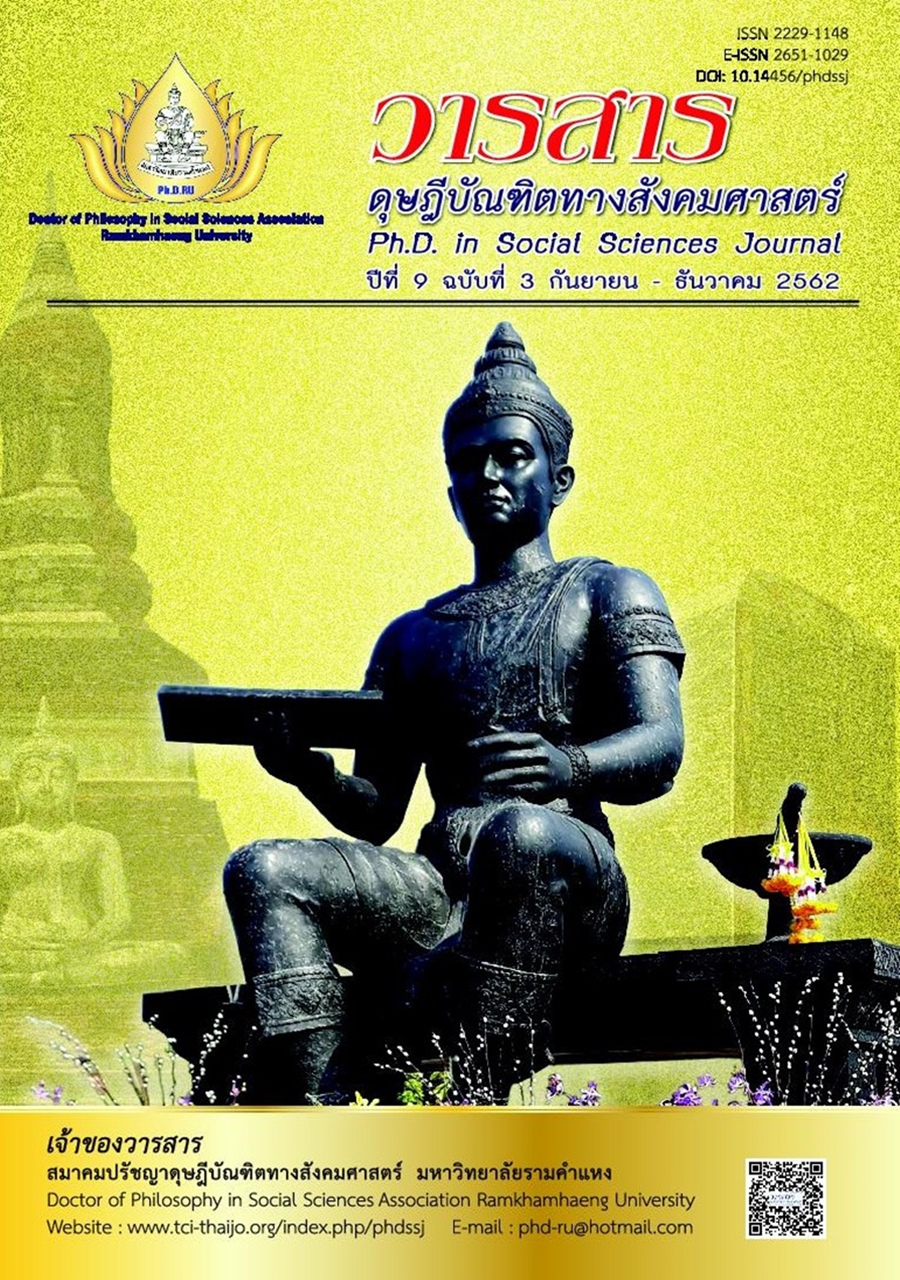Social Intelligence, Job Satisfaction and Organization Citizenship Behavior of Government Bank Staff in Bangkok
Main Article Content
Abstract
The purpose of this research were to study (1) the social intelligence of government bank staff in Bangkok, (2) job satisfaction of government bank staff in Bangkok, (3) organization citizenship behavior of government bank staff in Bangkok. (4) the causal relationship of social intelligence and job satisfaction and organization citizenship behavior of the government Bank staff in Bangkok. Research Methodology was quantitative research. Questionnaires used to collect data from 600 staffs of government bank in Bangkok. The statistics used in the research were Mean, Standard Deviation and the Structural Equation Modeling.
The research results found that the overall Social Intelligence, Job Satisfaction and the Organization Citizenship Behavior of the Government Bank staff were at high level. The results of the hypothesis testing indicated that social intelligence had a direct influence on the organization citizenship behavior (DE = 0.14, p < 0.01) at statistical significance 0.01 (IE = 0.29, p < 0.01) and the predicted variance of social intelligence were 28.0 (R2 = 0.28) at moderate level. When combined, the coefficients of direct influence were 0.14 and 0.29, respectively, which was 0.43. This means that social intelligence had a significant influence on the good behavior of the organization. The result of this analysis was consistent with the results of the tests. The direct influence of social intelligence on job satisfaction. And job satisfaction leads to good corporate behavior. Social influences indirectly influence the well-being of the society. It supported the hypothesis of the research that: Social intelligence had a direct positive influence on job satisfaction. Social intelligence had a direct influence on good organizational behavior. Job satisfaction had direct influence. Positive organizational behavior and social intelligence had a positive indirect influence on organizational well-being behavior through job satisfaction.
Article Details
Academic articles, research articles, and book reviews in the Ph.D. in Social Sciences Journal are author’s opinions, and not the publisher’s, and is not the responsibility of the Ph.D. in Social Sciences Journal Philosophy Association, Ramkhamhaeng University. (In the case that research is done on human, the researcher has to be trained in Ethics for Doing Research on Human Training and has to produce the evidence of the training).
References
Buzan, T. (2002). The power of social intelligence 10 ways to tap into your social genius. New York: Harper Collins.
Crowne K. A. (2009). The relationships among social intelligence, emotional intelligence and cultural intelligence. Organization Management Journal, 6(3), 148-63.
Dubrin, J. (1996). Effective business psychology. Englewood Clifts, NJ: Prentice Hall.
George, J. M., & Jones, G. R. (1999). Understanding and mamaging: Organizational behavior (2nd ed.). Boston: Addison-Wesley.
Glawiggit, D. (2004). The relationship between emotional intelligence, personality, job satisfaction and service quality of the front line staff in Thai Airways International Public Company Limited. Master's thesis of industrial psychology, Kasetsart University. [In Thai]
Goleman, D. (2006). Social intelligence: The new science of human relationships. New York: Arrow Books.
Greenberg, J., & Baron, R. A. (1997). Behavior in organizations: Understanding and managing the human side of work. Upper Saddle River, NJ: Prentice Hall.
Herzberg, F. (1993). The motivation to work. New Brunswick, Canada: Transaction.
Locke, E. A. (1976). The nature and causes of job satisfaction. In M. D. Dennett (Ed.), Handbook of industrial and organizational psychology, vol. 1 (pp. 1297-1343). Chicago: Rand McNally.
Maschane, S. L., & Gilnow, M. A. (2000). Organizational behavior. New York: McGraw-Hill.
Mehboob, F., & Bhutto, N. A. (2012). Job satisfaction as a predictor of organizational citizenship behavior. A Study of Faculty Members at Business Institutes. International Conference on Business, Economics, Management and Behavioral Sciences (ICBEMBS’2012) January, 7-8, 2012, Dubai.
Moorhead, G., & Griffin, R. W. (1995). Organizational behavior (4th ed.). Boston: Houghton Mifflin.
Motowidlo, S. J. (1997). Task performance and contextual performance: The meaning for personnel selection research. Human Performance, 10(2), 99-109.
Mozafari, M. M., Bejestani, A. M. N., & Ghafori, N. (2012). The relationship between seasonal employees’ job satisfaction and organizational citizenship behavior. African Journal of Business Management, 6(20), 6234-6242
Newstrom, J. W., & Davis, K. (1997). Organizational behavior: Human behavior at work (10th ed.). New York: McGraw-Hill.
Organ, D. W. (1997). Organizational citizenship behavior: It’s construct clean-up time. Human Performance, 10(2), 85-97.
Salovey, P., & Mayer, J. D. (1990). Emotional intelligence: Imagination, cognition, and personality. New York: Basic Books.
Weiss, D.J., Dawis, R.V. England, G. W. and Lofquist, L. H. (1967), Manual for the Minnesota satisfaction questionnaire, vol. 22, Minnesota Studies in Vocational Rehabilitation, Minneapolis: University of Minnesota, Industrial Relations Center.


